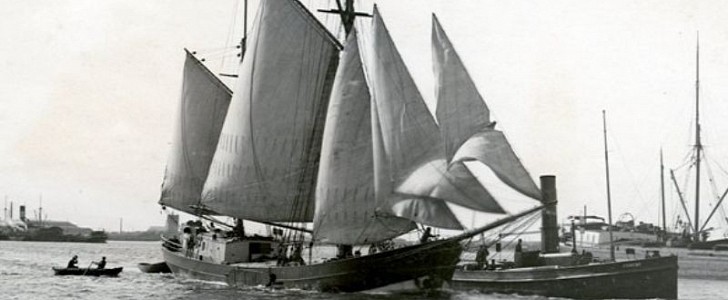Sailing is making a big comeback in the maritime industry, as modern technology enables a much more efficient use of wind power, one of the cleanest sources of renewable energy. In addition to building new sail vessels from scratch, a Dutch company wants to also retrofit existing ships, such as this respectable boat from the twentieth century.
EcoClipper, a Dutch startup, believes in the future of the sail cargo industry and is determined to send more sailing vessels at sea. At the moment, it’s working on both a prototype that will be built based on a nineteenth-century model, as well as retrofitting an old Dutch sailing boat from 1912.
Called the Tukker, this venerable boat is a klipper, also known as “Schoeneraak,” which is a type of vessel that was designed for high speed, thanks to its sharp lines, tall masts, and the widest-possible spread of canvas. The Tukker operated as a cargo ship even back then, in 1912, on the North Sea. In the ‘80s, it was repurposed, and gained notoriety as a training vessel, also working with disadvantaged youth.
Sadly, by 2012, the Tukker ceased its operations, because it was in dire need of major repairs. A decade later, the team at EcoClipper is ready to get the Tukker back on water. Although there’s a lot of work that needs to be done, including the construction of a new deckhouse, plus upgrading the rigging and all of the onboard systems, this venerable boat could successfully start transporting cargo once more.
With a barge shape and an almost flat base, this centuries-old vessel has enough room to accommodate up to 12 future trainees and transport over 70 tons of cargo. When it’s ready to hit the sea again, the Tukker will become EcoClipper’s first retrofit vessel.
On the other hand, the young company is also working on a modern clipper concept, called the EcoClipper500, which is meant to boost the maximum propulsion power that an emissions-free vessel can get, thanks to more than 23 sails.
EcoClipper’s future cargo ships, both new and retrofitted, will operate on fixed routes, following a regular schedule. The company’s research found that this is the best way to make the most of their sailing capabilities. The Tukker could become the first sail cargo vessel operating on the North Sea route, in a fixed service capacity.
Called the Tukker, this venerable boat is a klipper, also known as “Schoeneraak,” which is a type of vessel that was designed for high speed, thanks to its sharp lines, tall masts, and the widest-possible spread of canvas. The Tukker operated as a cargo ship even back then, in 1912, on the North Sea. In the ‘80s, it was repurposed, and gained notoriety as a training vessel, also working with disadvantaged youth.
Sadly, by 2012, the Tukker ceased its operations, because it was in dire need of major repairs. A decade later, the team at EcoClipper is ready to get the Tukker back on water. Although there’s a lot of work that needs to be done, including the construction of a new deckhouse, plus upgrading the rigging and all of the onboard systems, this venerable boat could successfully start transporting cargo once more.
With a barge shape and an almost flat base, this centuries-old vessel has enough room to accommodate up to 12 future trainees and transport over 70 tons of cargo. When it’s ready to hit the sea again, the Tukker will become EcoClipper’s first retrofit vessel.
On the other hand, the young company is also working on a modern clipper concept, called the EcoClipper500, which is meant to boost the maximum propulsion power that an emissions-free vessel can get, thanks to more than 23 sails.
EcoClipper’s future cargo ships, both new and retrofitted, will operate on fixed routes, following a regular schedule. The company’s research found that this is the best way to make the most of their sailing capabilities. The Tukker could become the first sail cargo vessel operating on the North Sea route, in a fixed service capacity.






